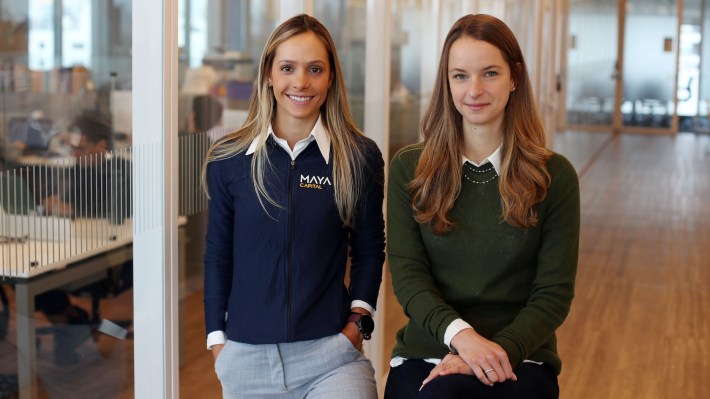Lara Lemann and Monica Saggioro of Sao Paulo–based MAYA Capital take a regional approach to investing, and their strategy is paying off. The investors raised $40 million for their first fund after starting the firm in 2018 and have now closed on $100 million in capital commitments for MAYA’s second fund.
With their first fund, they backed over 29 companies in 12 sectors across Brazil, Mexico, Colombia and Chile. Two of those investments became unicorns — food tech company NotCo and e-commerce aggregator Merama.
This new fund triples the firm’s assets under management and will enable the pair to invest in another 25 to 30 companies, with 50% reserved for follow-in funding, Lemann, co-founder and managing partner, told TechCrunch. MAYA will also double down on its focus on leading the first check into companies and is expanding its reach among Spanish-speaking founders across Latin America.
Its first fund was split 65% in Brazil and 35% in the rest of the region, and Lemann expects to do a more even split of around 50% in Brazil and 50% in Spanish-speaking LatAm. That approach has enabled Lemann, Saggioro and their team to help the MAYANs — their name for the companies in their portfolio — scale from Latin America into Brazil and vice versa.
“The idea is we want to be investing in the top founders and in the companies that are going to be the winners in the region,” she added. “We see that the winner has traditionally been pan-regional, so that’s what we believe MAYA also needs to do.”
MAYA has “made a few investments” from the new fund already, Lemann said, but did not disclose any company names.
Lemann and Saggioro met in 2016 when Lemann was an angel investor and Saggioro was testing different business models at Harvard. What united them was the realization that not only was technology going to be a disruptor and innovator in Latin America, but also that there was not much capital committed to finance companies in the early stages.
They created MAYA to launch their first fund with the thesis of “leading the first venture round of the best teams in Latin America,” and bring more to the ecosystem than just capital, Lemann said.
“That’s why we’ve taken this approach of really getting our hands dirty with the portfolio,” she added.
MAYA helps companies primarily from seed to Series A in a few ways: hiring, go-to-market and fundraising. The firm helps source, interview and connect portfolio companies with potential talent. Last year, the firm made over 400 introductions to potential hires. It also made 200 vetted commercial connections and 250 introductions to top-tier funds for fundraising.
Additionally, the firm created its Female Force initiative to connect and mentor female founders, who continue to be underrepresented in Latin America.
Women make up just 2.4% of partners at venture firms, as well. We’ve seen many women bucking this trend, though, like True Wealth Ventures, which just closed on $35 million for its second fund.
However, while Lemann notes that fundraising was harder as women, as was breaking into the venture capital network, hers and Saggioro’s “diversified backgrounds make them a non-obvious team,” and that their difference is one of their strengths.
“We have directly diversified access to deal flow, and a large majority of our deal flow is female founders,” Lemann added. “The way that we analyze companies can be different because of our different views. We’re also very hands-on, which is different from all the other early-stage funds in the region. Being different is actually received as a very positive thing.”
Saggioro explained that limited partners liked that difference as well. Investors into MAYA’s second fund include fund of funds, like Cendana Capital, institutional investors, family offices and founders from Latin America, Europe and the U.S.
While there has been evidence of pulling back in both venture capital investments and LP commitments to funds, MAYA’s “solid performance” helped them be able to launch a new fund in this environment, she said.
“Most of our capital came from re-ups from our current investors,” Saggioro added. “We also brought in a lot of institutional investors who are used to working in cycles and were able to provide the dry powder needed to give an advantage to VC funds. Those who choose to start companies in moments like these are the most resilient ones, so we’re excited to continue to learn about those who are working hard to solve Latin America’s biggest problems.”
